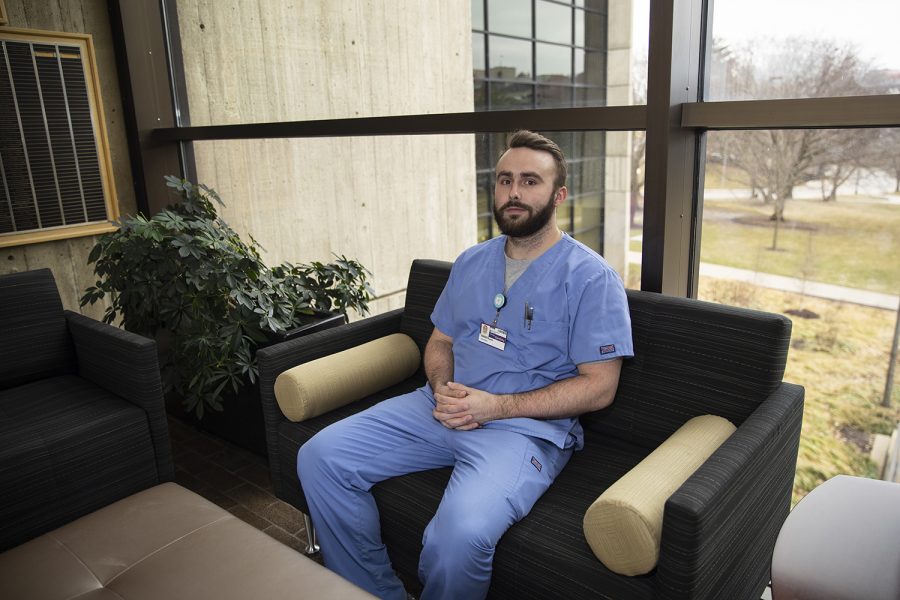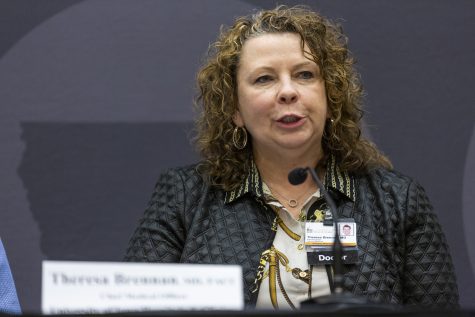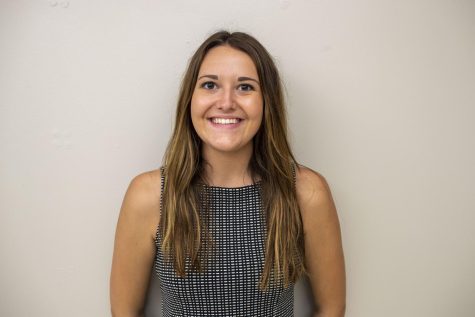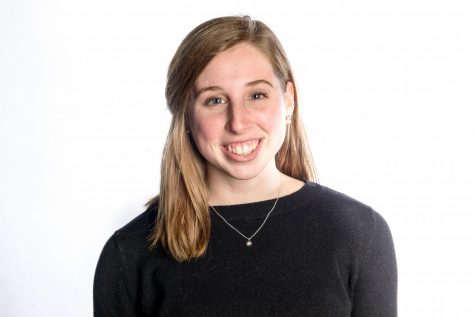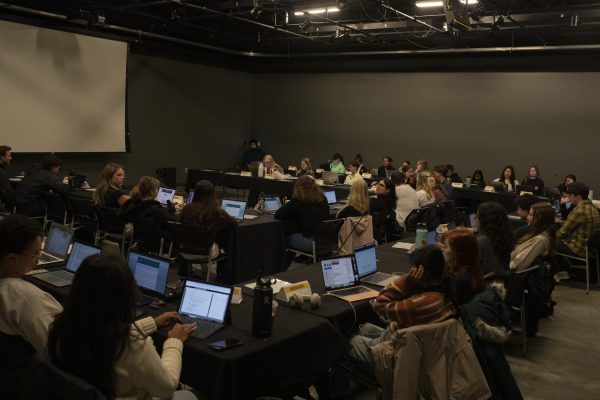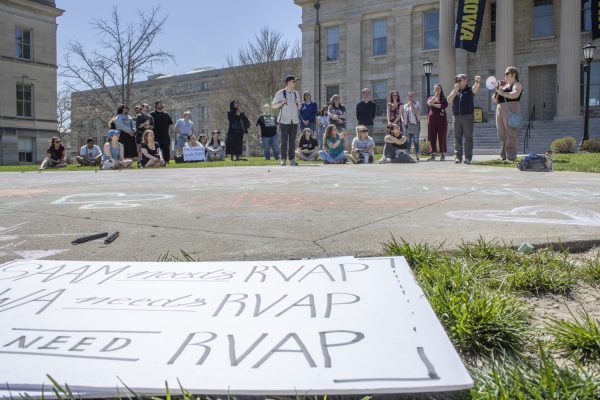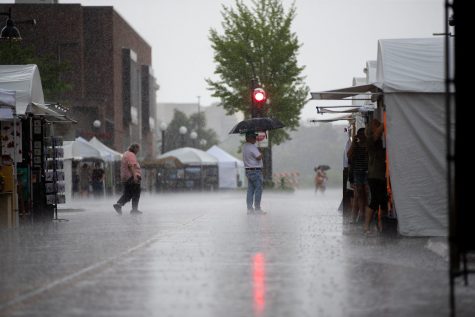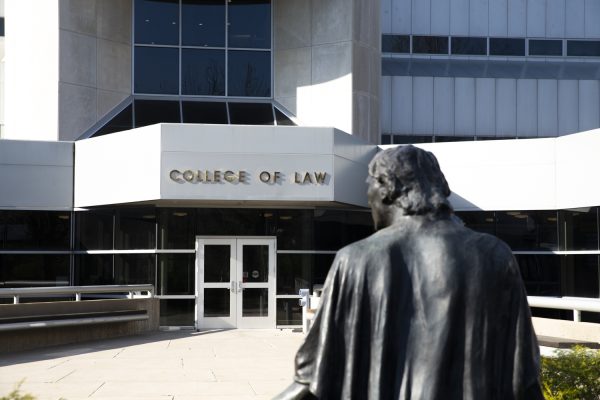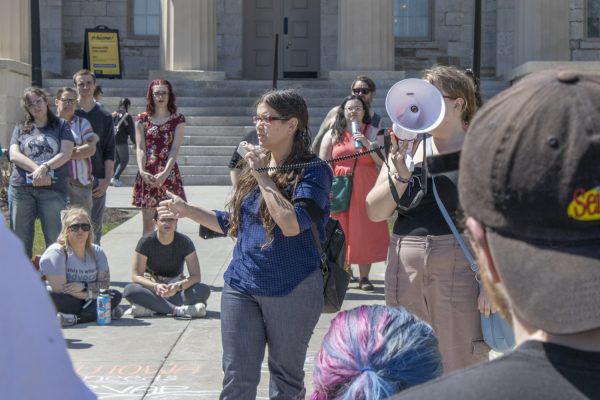Clinicals still on at University of Iowa medical colleges
University of Iowa Provost Montserrat Fuentes said students in the medical colleges would continue in-person clinicals, which are supervised interactions with patients required for graduation from several colleges.
Nathan Hubert poses for a portrait on Wednesday, March 11, 2020 in the Pappajohn Biomedical Research Institute. Hubert is a fourth year dentistry student.
March 11, 2020
University of Iowa’s medical colleges will continue to conduct clinical instruction as the UI plans to temporarily cancel most in-person classes for two weeks after spring break.
In an email to students on Thursday, the Carver College of Medicine Dean Brooks Jackson, the Vice President of Medical Affairs, asked students to continue day-to-day clinical rotations and regular responsibilities. However, the college will limit access to work in hospital areas where students need personal protective equipment, such as operation rooms, in an effort to conserve supplies, Jackson added. Students are not expected to work on COVID-19 cases.
For all classroom instruction, including lectures and seminars, professors will transition to online instruction, Jackson’s email stated. In a follow-up email from Senior Associate Dean for Medical Education Chris Cooper, he said as of now, the college is advising all medical students to return as planned March 23 to be in closer proximity as the college continues to update its online learning methods.
“We are asking for you to be prepared to be flexible,” Cooper wrote Thursday. “The situation is evolving. We may try a certain teaching method, determine it was unsuccessful and move to a different method. Our goal is to have the least amount of disruption as possible.”
“We will not change clinical rotations or clinical instruction,” University of Iowa Provost Montse Fuentes said at a Wednesday press conference announcing the UI’s two-week hiatus of in-person instruction. “This is a critical part of our students’ training. However, we are taking additional precautions to ensure their safety.”
Clinicals involve students conducting supervised treatment of patients, and take place in Iowa’s medical-based colleges, such as the Carver College of Medicine, the College of Dentistry, and the College of Nursing.
University of Iowa Health Care will also suspend all work-related domestic travel, the Thursday email stated, taking the rolling 30-day international university-related travel ban another step further. The Board of Regents implemented the 30-day travel ban March 5 and will evaluate and extend the moratorium by another seven days every Monday beginning March 9.
Jackson added that personal travel should be “carefully considered” in order to keep up adequate staffing numbers.
“To ensure adequate staffing levels, all non-essential personal domestic and international travel before March 23 should be carefully considered and after spring break is discouraged,” Jackson wrote in the Thursday email.
Leading up to the UI’s Wednesday announcement, emails from administrators instructed that Carver students and nonessential personnel would be restricted from operating rooms because of an anticipated shortage in protective personal equipment, including operating room head covers, masks, and gowns, according to an email forwarded from Jackson sent to UI medical students.
Senior Associate Dean for Medical Education Chris Cooper forwarded the message to students saying he hoped the restrictions wouldn’t last long.
“Please see the note below which prohibits you from seeing patients that require you to wear PPE (personal protective equipment) effective immediately. This is because of anticipated shortages in PPE,” Cooper wrote. “Thanks for your compliance and understanding with this request which we all hope will be short lived.”
The UI announced Wednesday face-to-face instruction will be suspended beginning after March 23 until at least April 3, though campus buildings, residence halls, recreation services, and the UI Hospitals and Clinics will remain open.
Fuentes said the university was considering how to proceed on a case-by-case basis with classes such as science labs, performance, and art classes that would be difficult or impossible to conduct online.
According to the email sent to all UI students Wednesday, the university will shift classroom settings online to the “greatest extent possible.”
“We are evaluating how to provide classroom experiences such as laboratory and performance classes virtually, and the academic units will provide specific guidance by March 20, 2020,” the email stated.
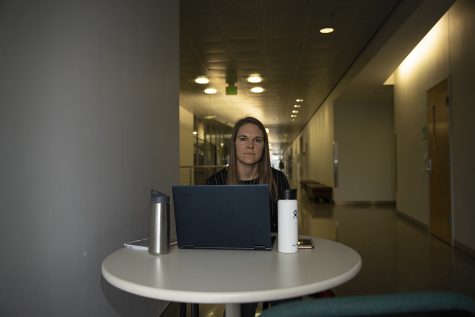
Megan Cannon poses for a portrait on Wednesday, March 11, 2020 in the Pappajohn Biomedical Research Institute. Cannon is a first year student in the physician’s assistant program.
Fuentes added during the press conference that the university would prioritize making sure the class cancellation wouldn’t affect graduation timelines for students expected to graduate in May.
At a Graduate and Professional Student Government meeting Tuesday night, before the university-wide announcement went out, Carver College of Medicine Student Government representative David Moore said the college presented recommendations from the American Association of Medical Colleges to the state Board of Regents, to aid members in making the choice to move to an online-based curriculum for medical students.
Recommendations stated that students undergoing pre-clinicals should convert to an online-based class structure, Moore said, and that students in clinicals should remain on campus and continue in-person work in the hospital.
He added that university officials were still deciding best practices to dovetail continuing clinical trainings with keeping cases of the coronavirus contained.
As of Wednesday, 12 of the 13 cases of COVID-19 in Iowa were Johnson County residents, and all had traveled on an Egypt cruise in early March. Health officials traced the source of the remaining person’s presumptive coronavirus case to a visit to California. No cases of the virus have originated from a source inside the state.
“Since [the virus] is not community spread, they have been able to identify transmission and keep it contained,” Moore said. “When it becomes community spread, that is the problem. It’ll be a bridge we have to cross to determine whether students will be involved in the care of patients.”
RELATED: University of Iowa to move classes online for two weeks after spring break amid coronavirus outbreak
UI Hospitals and Clinics is treating a coronavirus patient in “critical condition” and UIHC Chief Medical Officer Theresa Brennan said the individual was a traveler. She did not confirm whether the patient was one of the individuals on the Egypt cruise ship.
In updated guidance Tuesday, Cooper told students in the college of medicine in an email that they could obtain bouffant hats and masks as they aren’t sterile, and use it repeatedly over the course of several weeks as long as it doesn’t become contaminated. Those would permit students to observe an operation or anesthesia, but wouldn’t allow students to be at the table side.
Megan Cannon, a first year in the UI physician assistant program said that her biggest concerns revolve how small groups and patient interaction will work.
Cannon said that patient interaction has been limited due to restrictions seeing patients that exhibit anything infectious or that require personal protective equipment.
“The majority of lectures are already online or have online capability, so that doesn’t concern me,“ Cannon said. “I am hopeful that we will still have our small groups since it isn’t a giant amount of people meeting in one room, so our education should still go smoothly.”
Another first-year medical student in the UI Carver College of Medicine, Chris Halbur said that the situation doesn’t affect much of their education.
“Only a small proportion of our day is lecture and then the rest consists of meeting in small groups and studying, so we aren’t too concerned about switching to online learning. I’m sure there is more anxiety within the older med students who have more contact with patients,” Halbur said.
Fourth-year UI College of Dentistry Student, Nathan Hubert, is currently working business as usual in his clinicals with patients.
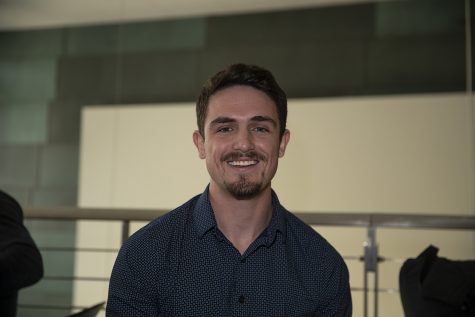
Chris Halbur poses for a portrait on Wednesday, March 11, 2020 in the Pappajohn Biomedical Research Institute. Halbur is a first year student in the UI College of Medicine.
There is heavier screening of patients now, Hubert said. They check patients and clinicians for any symptoms and any asymptomatic patients are still accepted to the clinics.
“We just ask that older, more susceptible patients stay home from the clinic unless their appointment is urgent or they are in pain,” Hubert said. “Clinicals are continuing to run smoothly and our graduation plans aren’t being interfered with.”
Boudreau, the college of public health representative in GPSG, said the university faced this problem before when campus was affected by the 2008 Iowa Flood and was forced to shut down buildings, including the public-health building.
“If we’ve done it before, we can do it again. I’m not worried. Our priority is not putting students in danger,” Boudreau said.
Boudreau said that while the virus will potentially have a negative impact on the university, it is providing College of Public Health graduate students experience in handling the spread of viruses such as this.
“[The coronavirus] is really opening people’s eyes to the footprints they are leaving,” she said. “People are being more aware of hygiene practices, and it’s also providing insight to mental health in isolation.”
She said that watching her professors handle the situation has prepared her for her future career in public health.
“As a public-health student, watching your superiors teach us how to handle situations appropriately is fantastic,” Boudreau said. “I have been directed by the right people, and now I feel confident to handle circumstances like this.”
GPSG Grants Director Andrew Friederich said that several graduate student conferences have been canceled due to coronavirus concerns. GPSG awards up to $500 to select graduate students to help with travel costs to those conferences. Despite cancellations, Friederich said that travel grants awarded could go toward non-refundable travel expenses, such as flights and housing.
“Instead of taking the money back … the university and GPSG are allowing students to use their grant award to cover their nonrefundable expenses as long as they make a good-faith effort to try to get their money back,” Friederich said.
Grant allocations will be determined by whether or not conferences continue to cancel, he said, and several students have withdrawn applications for grants in anticipation of this. Friederich added, however, GPSG wouldn’t change their funding model.
“We are not canceling on anyone and we will continue [to] welcome anyone interested in GPSG funding,” Friederich said.
Sarah Watson contributed reporting to this article.
What questions do you have about the coronavirus outbreak? Let us know by filling out this form.
Follow the DI’s latest coverage of COVID-19 updates here.
View the DI’s interactive map: How are other colleges dealing with the coronavirus?



